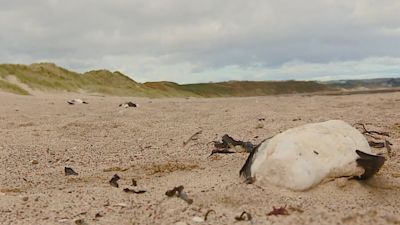Why are hundreds of seabirds washing up dead on the Northumberland coastline?

WARNING: This article contains images of dead birds.
An unprecedented number of seabirds have been found dead or starving on the Northumberland coast.
Hundreds of guillemots and razorbills - and smaller numbers of puffins and kittiwakes - have been affected.
But the cause of their demise is unknown. Why might these precious be creatures dying in such large numbers?
Lack of food
At this time of year, the birds should be out at sea - plumping up for the winter months ahead.
Instead, they are showing up emaciated on the beach. Could the birds be starving to death due to a lack of fish - possibly the result of overfishing and climate change?
Kittiwakes are dying out due to climate change and overfishing, RSPB warns
Call to ‘grab chance’ to end overfishing in Europe’s seas amid lockdown
Dr Francis Daunt from UK Centre for Ecology and Hydrology says sightings of feeding birds bring this "obvious explanation" into question.
Blue algae
Are the birds ingesting poison?
Blooms of blue algae - a bacteria which can produce toxins that are harmful to pets and wildlife - have recently appeared off the Scottish coastline.
There have currently been no confirmed cases of bird deaths in Northumberland due to blue algae poisoning.
Avian flu
The Department for Environment, Food and Rural Affairs (DEFRA) has been made aware of the deaths and has tested some of the birds for avian flu.
There have been no reports of positive cases and the UK remains free of avian flu.
So the mystery continues. Volunteers like Richard Simpson hope finding the cause will save future birds from sharing the same fate.